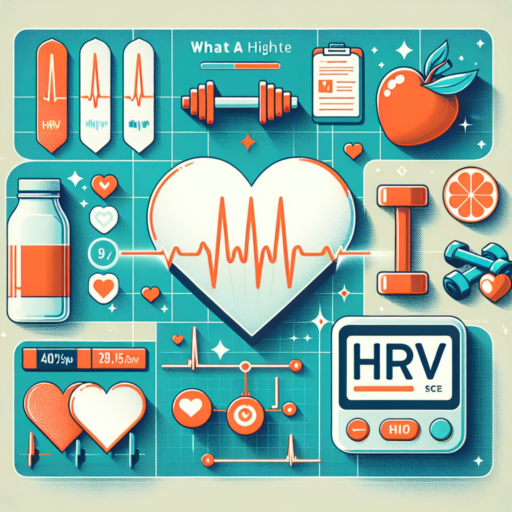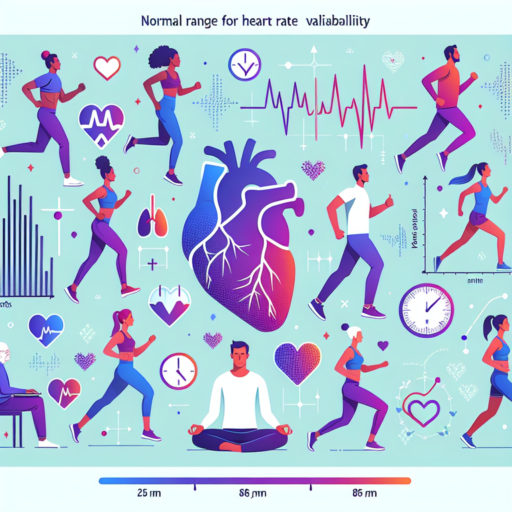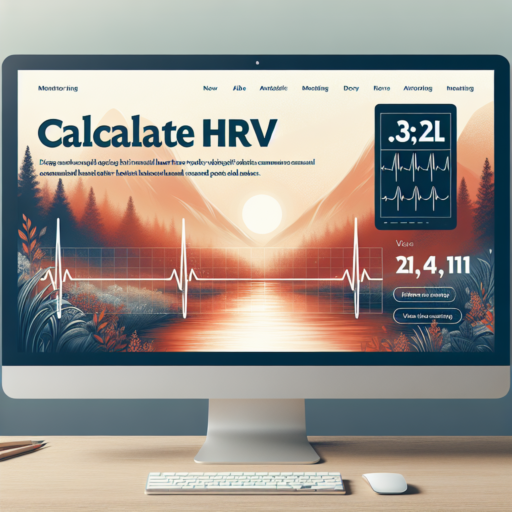Understanding Heart Rate Variability (HRV)
Heart Rate Variability (HRV) is a crucial metric that measures the variation in time intervals between heartbeats. Unlike a steady heartbeat rate, which might indicate a simple, steady pace, HRV looks at the subtle changes in time between each heartbeat. This variation is critical because it reflects the body’s ability to adapt to stress, manage physiological functions, and maintain balance within the autonomic nervous system. A higher HRV suggests a healthier, more resilient heart capable of efficiently responding to environmental and internal stressors.
The autonomic nervous system (ANS) plays a pivotal role in regulating HRV. Comprising sympathetic and parasympathetic branches, the ANS controls involuntary body functions, including heart rate. The sympathetic branch is often referred to as the «fight or flight» system, preparing the body for action, while the parasympathetic system is akin to a «rest and digest» state, helping the body to relax and recuperate. HRV serves as a window into the balance and interaction between these two branches, with a higher variability indicating a healthier balance and a more adaptable cardiovascular system.
Monitoring HRV has become increasingly popular among athletes, health enthusiasts, and those looking to optimize their wellbeing. It provides insightful data about recovery, stress levels, and overall cardiovascular health. Techniques to improve HRV include mindfulness exercises, regular physical activity, and proper sleep habits. By focusing on these areas, individuals can potentially enhance their HRV, thereby improving their stress resilience, heart health, and general wellbeing.
What Does a High HRV Score Mean for Your Health?
Understanding your Heart Rate Variability (HRV) score plays a crucial role in gauging your overall health and wellness. A high HRV score generally indicates robust heart health and a strong autonomic nervous system. But what does this mean for your day-to-day well-being? Let’s explore the implications of a high HRV score on your health.
Firstly, a high HRV score signifies a greater ability of your heart to adapt to stress, be it physical stress from exercise or emotional stress from daily life challenges. This adaptability is paramount in today’s fast-paced world, where stressors are omnipresent. With a high HRV, your body can efficiently manage and recover from stress, reducing the potential negative impacts chronic stress can have on your health.
Key Benefits of a High HRV Score
- Enhanced Recovery: A higher HRV improves your body’s ability to recover not just from physical exertion but also from injuries and illnesses.
- Better Stress Management: It equips you with a naturally higher resilience to stress, contributing to improved mental health and reducing the risk of stress-related ailments.
- Improved Physical Performance: Athletes with high HRV scores often experience better overall performance, as their bodies can adapt and recover more swiftly.
In summary, a high HRV score is indicative of a body that is not only well-equipped to handle stress but also has an enhanced capacity for recovery and performance. Whether you’re an athlete striving for peak performance or someone looking to improve their day-to-day wellness, understanding and optimizing your HRV can be a game-changer for your health.
The Benefits of Achieving a Higher HRV Score
Understanding and improving your Heart Rate Variability (HRV) can offer significant benefits to your overall health and wellness. A higher HRV score, indicating more variability between heartbeats, is often linked to better cardiovascular condition, enhanced mental well-being, and improved physical performance. It’s a critical metric for athletes and health-conscious individuals alike, highlighting the resilience and adaptability of the heart and nervous system.
Better Stress Management: One of the key benefits of a higher HRV score is its association with improved stress management capabilities. Studies have shown that individuals with higher HRV scores tend to have a more robust response to stress, recovering more quickly and efficiently from stress-induced situations. This enhanced ability to manage stress is crucial for maintaining mental health, reducing anxiety levels, and improving overall quality of life.
Enhanced Physical Performance: For athletes and fitness enthusiasts, a higher HRV score is an indicator of optimal training and fitness levels. It signals that the body is well-recovered and ready for high-intensity activities, allowing for maximized performance. Furthermore, tracking HRV can help in avoiding overtraining and developing a more effective training regimen tailored to the body’s recovery needs.
Improved Health Outcomes: Achieving a higher HRV score is also linked to better health outcomes. It is associated with reduced risk of cardiovascular diseases, enhanced immune system function, and even a longer lifespan. By focusing on activities and lifestyle changes that increase HRV, individuals can take proactive steps towards maintaining a healthier life.
Factors That Can Influence Your HRV Score
Understanding your Heart Rate Variability (HRV) score is crucial for gauging your overall well-being and fitness level. Several key factors can influence your HRV, reflecting the balance between your sympathetic and parasympathetic nervous systems. Here, we delve into these components to help you achieve a better insight into your body’s inner workings.
Physical Activity and Exercise
First and foremost, physical activity plays a significant role in affecting your HRV scores. Regular exercise tends to increase HRV, indicating a healthy, resilient heart. However, overtraining or excessive physical exertion without adequate recovery can lead to a decreased HRV, signaling stress and potential overstrain on the body. It’s vital to find a balance in your exercise regimen for optimal health outcomes.
Stress and Relaxation Levels
Stress is another pivotal factor that can significantly impact your HRV score. When you’re under stress, your body’s sympathetic nervous system activates, leading to lower HRV levels, which indicate a lack of variability between heartbeats. Conversely, practicing relaxation techniques such as meditation, yoga, or even deep-breathing exercises can enhance your HRV by promoting parasympathetic activity, showcasing your body’s adaptability and resilience to stress.
Understanding the multitude of elements that influence your HRV score is instrumental in taking proactive steps toward improving your heart health and overall well-being. By focusing on these key aspects, you can effectively monitor and adjust your lifestyle choices to foster a healthier, more balanced state.
How to Measure Your HRV Score Accurately
Measuring your Heart Rate Variability (HRV) score with accuracy is crucial for getting insights into your autonomic nervous system and overall health. HRV measures the variation in time between each heartbeat, which is linked to your body’s stress response and resilience. To ensure the accuracy of your HRV score, follow these guidelines.
Choose the Right Tool
Selecting the appropriate device is essential for measuring your HRV accurately. Options range from wearable devices like smartwatches and fitness trackers to dedicated HRV sensors and apps. Look for devices that offer high-resolution PPG (photoplethysmography) or ECG (electrocardiography) measurements, as these technologies provide the most reliable data.
Consistent Measurement Conditions
Consistency in measurement conditions plays a pivotal role in obtaining accurate HRV readings. To minimize variability, measure your HRV at the same time each day, ideally in the morning upon waking but before getting out of bed. Ensure you are in a rested state, lying down, and have not consumed caffeine or engaged in strenuous exercise beforehand.
Interpreting Your HRV Score
Understanding your HRV score involves more than just the raw numbers; it’s about recognizing the trends over time. An increasing HRV trend typically indicates improved fitness and stress resilience, while a decreasing trend may suggest fatigue, stress, or potential health issues. Comparing your daily scores against your own baseline will provide more meaningful insights than comparing with others, as HRV is highly individual.
Improving Your HRV Score: Practical Tips and Strategies
Understanding and enhancing your Heart Rate Variability (HRV) score can be a game-changer in your journey towards optimal health and well-being. HRV measures the variation in time between each heartbeat, which is a direct indicator of your autonomic nervous system’s ability to adapt and manage stress. Improving your HRV score isn’t just about boosting your physical fitness; it’s about enhancing your overall resilience and stress management capabilities.
Engage in Regular Physical Activity
One of the most effective strategies to improve your HRV score is through regular, moderate exercise. Activities such as brisk walking, cycling, or swimming can significantly enhance your heart’s efficiency and its ability to manage stress. It’s not about the intensity but the regularity of the exercise that counts. Incorporating a routine that includes 30 minutes of moderate exercise at least five days a week can lead to noticeable improvements in your HRV score over time.
Practice Mindfulness and Meditation
Mindfulness and meditation practices have been shown to have profound effects on the autonomic nervous system, thereby improving HRV. Techniques such as deep breathing exercises, yoga, and meditation not only help in reducing stress but also in enhancing the body’s resilience to it. Dedicating just 10 to 15 minutes of your day to these practices can make a significant difference in your HRV score and overall stress management.
Achieve Quality Sleep
Quality sleep is another cornerstone of improving your HRV score. Poor sleep habits and lack of restorative sleep can severely impact your body’s stress response and, consequently, your HRV score. Establishing a regular sleep schedule, creating a restful environment, and avoiding stimulants before bed can aid in achieving deeper, more restorative sleep cycles. Aim for 7 to 9 hours of quality sleep per night to support your heart’s health and improve your HRV score.
The Role of Diet and Nutrition in Boosting Your HRV Score
Understanding the impact of diet and nutrition on your body is pivotal in enhancing your Heart Rate Variability (HRV) score. A high HRV is often associated with better cardiovascular fitness, resilience to stress, and overall wellness. The foods you consume play a significant role in either bolstering or diminishing your HRV, affecting your body’s ability to respond to stress and recover from exercise efficiently.
Nutrient-Rich Foods and Their Impact on HRV: Prioritizing whole, nutrient-dense foods like fruits, vegetables, whole grains, and lean proteins can profoundly influence your HRV. These foods are rich in antioxidants, vitamins, and minerals essential for heart health and can help reduce inflammation in the body, subsequently improving HRV scores. The Mediterranean diet, for instance, is renowned for its positive effects on heart rate variability alongside overall cardiovascular health.
On the contrary, diets high in processed foods, sugars, and unhealthy fats have been found to adversely affect HRV. These types of foods can increase inflammation and oxidative stress, leading to a decrease in HRV scores. Thus, making mindful choices about the quality of food you consume can be a crucial step in improving your HRV and, by extension, your general health and well-being.
Exercise and Its Impact on Heart Rate Variability
The relationship between exercise and heart rate variability (HRV) is both intricate and essential for understanding cardiovascular health. HRV measures the time interval between heartbeats, which varies as the heart responds to varied demands on the body. Engaging in regular physical activity has been shown to significantly enhance HRV, indicating a healthier, more resilient cardiovascular system.
Types of Exercise and Their Effects on HRV: Not all exercises influence heart rate variability in the same manner. Aerobic exercises, such as jogging, swimming, and cycling, generally increase HRV, reflecting improved autonomic nervous system balance and cardiovascular fitness. On the other hand, high-intensity interval training (HIIT) can lead to immediate reductions in HRV, due to acute stress on the body, but over time can enhance baseline HRV levels, demonstrating the importance of exercise intensity and recovery periods.
Understanding the nuances of how different exercises affect heart rate variability is crucial for tailoring fitness plans that optimize cardiovascular health. By monitoring HRV, individuals can gauge their body’s response to different types of exercise and adjust their routines to maximize health benefits. This approach ensures a balanced workout regimen that supports heart health and overall well-being.
Understanding the Limitations and Considerations of HRV Scores
When diving into the realm of Heart Rate Variability (HRV) scores, it’s pivotal to grasp not just the advantages but also the inherent limitations and considerations associated with these measurements. While HRV scores offer invaluable insights into autonomic nervous system activity and overall well-being, interpreting these scores requires a nuanced understanding of the underlying factors that can influence them.
Impact of External Factors on HRV
One of the key considerations when evaluating HRV scores is the influence of external factors. Elements such as stress levels, sleep quality, caffeine intake, and physical activity can significantly alter HRV readings. Consequently, to ensure accurate interpretation, it is critical to account for these variables, recognizing that fluctuations in HRV may not solely reflect changes in health or fitness levels.
Individual Variability in HRV Scores
Another crucial aspect to consider is the individual variability inherent in HRV scores. Factors such as age, genetic predispositions, and even time of day can lead to significant differences in HRV readings between individuals. This individual variability underscores the importance of personalized analysis and cautions against direct comparisons between different people or even between different times for the same individual.
Understanding the limitations and considerations of HRV scores is essential for their accurate application in health and wellness monitoring. By acknowledging the significant impact of external factors and individual variability, users can better interpret their HRV scores, making informed decisions to optimize their health and performance.
No se han encontrado productos.
Case Studies: Success Stories of Increasing HRV Scores
In the quest for optimal wellness and vitality, Heart Rate Variability (HRV) has emerged as a crucial indicator. Numerous case studies have underscored the pivotal role of personalized lifestyle modifications in boosting HRV scores. Below, we delve into the narratives of success, showcasing the potent impact of targeted interventions on HRV enhancement.
One compelling narrative originates from a group of office employees who embarked on a structured stress management program. This cohort experienced a significant upsurge in their HRV scores over a 6-month period, underscoring the influence of psychological well-being on autonomic balance. The program’s blend of mindfulness, regular moderate exercise, and nutrition adjustments illuminated the path to not only improved HRV but also to enhanced overall health.
In the domain of elite athletics, another study unveiled the transformative effects of tailored training and recovery protocols on HRV. Athletes who adhered to individualized rest schedules and engaged in specific recovery practices observed noteworthy improvements in their HRV scores. This advancement translated into better performance, reduced injury risk, and optimized training outcomes. Here, the synergy between precise recovery strategies and HRV elevation was vividly illustrated, marking a milestone in sports science.




